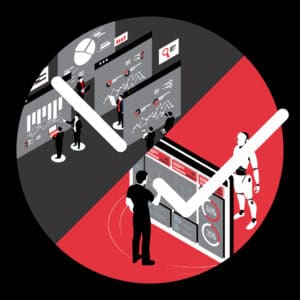7 Advantages of Modern Enterprise Technology
Enterprise technology is great — but only when it’s up to date, correctly implemented, and tailored to your business needs. At best, outdated programs and old electronics complicate life; at worst, they actively prevent growth and make digital transformation completely impossible.
The business landscape has evolved rapidly since the pandemic. Companies have sought creative ways to serve customers efficiently, streamline business processes, and ensure growth. The adoption of modern enterprise technology is crucial to remain competitive.
So, is your enterprise tech past its sell-by date? This article will delve into the most important benefits of incorporating modern technology into your business operations, and we’ll tell you how to spot expired software and why upgrading could save you time, money, and stress.
What Is Enterprise Technology?
Enterprise technology is a catchall term for all the IT resources — and all the data — you share across your business. Your content management system (CMS), customer relations management (CRM) software, and, if applicable, proprietary enterprise software all fall into the enterprise technology category.
In a broader sense, the enterprise technology umbrella also covers hardware: computers, servers, mobile devices, and PBX systems, for instance. Many companies with limited IT budgets have used the same electronics for years, upgrading specific components occasionally to save money. This strategy is almost always a mistake: if your tech isn’t up to scratch in today’s digital business landscape, you risk falling behind the curve. After all, legacy electronics can’t support cutting-edge software.
How Can Outdated Tech Hurt Your Business?
Simply put, outdated hardware and software tech won’t take you where you want to go. Obsolete computer systems eventually break down as internal components wear out, and older software gradually slides into obsolescence. Surely upgrading is a no-brainer? Well, you’d think so.
Gartner predicts that by the year 2025, a staggering 95% or more of fresh digital workloads will be assigned to cloud-native platforms, a substantial increase from the 30% recorded in 2021.
As this shift takes place, companies will have to adapt their operating models to focus more on products. This implies that the entire value chain, encompassing both business and IT aspects, will need to be synchronized based on products. Consequently, this transformation will give rise to new job positions and responsibilities like site reliability engineers, product managers, and communities of practices.
Some people like retro stuff, and that’s okay. Companies must adapt, however, to survive in the long term. According to recent research by Genpact, companies that embrace technologies like AI will vastly outpace non-AI companies by 2025, leaving late adopters dead in the water. By all means, wear bell bottoms to the disco — but reject digital transformation at your peril.
“By 2025, companies that have adopted AI will be 10 times more efficient and have twice the market share of companies that have not.” — Vikram Mahidhar, Genpact.
Seven Signs Your Enterprise Technology Needs an Upgrade
Your enterprise software feels comfortable, like an old shoe. Is that a good thing or a bad thing? Let’s find out. Here are seven signs your enterprise technology might need tossing out.
1. You Can’t Access New Opportunities
If you’ve been working the same system for a while and your competitors are ahead in the marketplace, it might be time to swap old for new. Older infrastructures are a real burden, not just from an internal perspective; outmoded tech can put potential customers off your company and depress your conversion rate.
New technology — including CaaS, PaaS, SaaS, and other lightweight cloud-based services — can help you turn visitors into customers. When consumers enjoy working with you, they morph into natural affiliates for your company.
2. Your System Feels Clunky
Dysfunctional systems make particular demands. If you modify processes to suit your outdated enterprise software, it’s time to move on. Modern collaborative tools — videoconference apps, for instance — don’t play well with legacy programs, and without an up-to-date communications suite, remote work is much more complex.
Spinning beach balls and sand timer icons don’t have a place in today’s digital business world. If your back end looks like a game of Minecraft and menus take more than a second to load, it could be time for a new IT strategy.
3. Sales Are Down
Your rival just released its quarterly shareholder report, and your company’s earnings don’t look so hot. What’s gone wrong? If you have not upgraded your electronics or systems lately, your sales sag could stem from tech neglect.
User experience is everything in today’s marketplace, and consumers gravitate toward excellent service. Businesses with updated enterprise technology accordingly run rings around those without. If your competitor subscribes to a new CRM and your company doesn’t, your rival will probably make a big profit while you count pennies.
4. Your Enterprise Isn’t Growing
You and your executive team devised a vision plan at the beginning of the year, but your company hasn’t grown as expected. Unfortunately, growth projections based on pure optimism usually don’t pan out.
Most successful companies try to envision the tech they’ll need well in advance. Instead of making do with old software and hardware, they invest in good-quality systems and electronics. Some businesses lease computers and other devices from hardware as a service (HaaS) providers to minimize risk and keep costs low.
5. Your Tech Isn’t Flexible
Last week, one of your suppliers wanted to connect your system with theirs via RESTful API — but your enterprise system doesn’t support API integration. Yesterday, you spent an hour on the phone negotiating a new bandwidth deal with your ISP. Sound familiar? Consider a more suitable setup if you have to wrestle your tech into submission regularly.
Modern tech stacks generally begin in the cloud. When businesses opt for cloud-based data storage, communications platforms, and SaaS e-commerce systems, they save a lot of money and gain flexible, scalable, sustainable tools for growth.
6. Work-Arounds Abound
If you jump through hoops to print documents or integrate new hardware, you might suffer from dated tech syndrome. Further symptoms include missed deadlines, decreased productivity, and frustrated IT professionals.
Tech can help, or it can hinder. Don’t let your enterprise technology hold you back. Instead, recover your eroding market share with modular IT solutions. Swap little pieces of your legacy stack for microservices, and soon, you’ll find it easier to respond to changes in the market.
7. Orphan Core Apps
Your enterprise software is the equivalent of an abandoned galleon floating on a vast digital sea. In other words, developer support for your ancient system ended years ago. If your IT department has to patch security risks because your program vendor no longer exists, let your system go.
When businesses rely on orphan apps, they scupper themselves. Older systems are leaky and easy to hack, so they don’t protect consumer data properly. In contrast, modern cloud-based programs receive regular updates and stay secure under pressure.
Why Upgrading to Modern Enterprise Technology is Crucial
In today’s digital era, industry standards are ever-evolving, and customer expectations are soaring. Modern technology choices ensure that your business remains agile, with the ability to adapt to market changes and customer needs. Transitioning to new technology enhances business operations and transforms the company culture, fostering innovation and collaboration.
Keeping Up with Market Trends
First and foremost, upgrading to modern technology allows your business to stay abreast of market trends. The industry is ever-evolving, and businesses that fail to keep up risk becoming obsolete. For example, many consumers now prefer doing business online. Companies that do not have an efficient online presence might lose a significant portion of their market share to competitors who do.
Enhanced Customer Experience
Customers today expect high-quality service, and they want it fast. With modern technology, your business can ensure quicker and more efficient service, increasing customer satisfaction. Leveraging customer data through CRM systems and utilizing chatbots for customer queries are examples of how modern technology can significantly impact the customer experience.
Making Data-Driven Decisions
Modern technology provides access to various tools and platforms for analyzing business data. This is vital for making informed decisions. For example, real-time analytics can give insights into how your products or services perform, allowing you to quickly adjust to meet customer demands.
Increased Operational Efficiency
Automating repetitive tasks through software solutions reduces the chances of human error and increases the efficiency of your business operations. This means your employees can focus on more important aspects of the business, such as developing new ideas and finding creative ways to serve customers.
Fostering Innovation
By adopting new technologies, your business can foster a culture of innovation. With tools that streamline communication and collaboration, employees are often more engaged and motivated to bring new ideas. This can lead to developing new products or services that could be groundbreaking for your industry.
Securing Your Assets
As the digital world evolves, so do the threats. Cybersecurity is one of the most important aspects of any business in the digital age. Modern technology offers sophisticated security solutions to protect your company’s and customers’ data from malicious attacks.
Adaptability and Agility
In a rapidly changing world, the ability to adapt is critical. Modern technology provides the tools and platforms needed for your business to respond quickly to changes in the market. Whether scaling operations, entering new markets, or adjusting product offerings, modern technology ensures your business can move quickly.e, fostering innovation and collaboration.
The 7 Advantages of Modern Enterprise Technology
Enhanced Communication and Collaboration
Modern tech tools like business VoIP and chat apps allow remote employees to stay connected and collaborate in real time, vital for business productivity and efficiency. Additionally, file-sharing platforms and project management tools make it easier for team members to share progress and keep track of tasks. This is particularly important in the current environment where remote working has become the norm for many employees. Enhanced communication also improves customer service, as employees can collaborate to solve customer issues more effectively.
Flexible and Scalable Systems
Cloud-based solutions offer businesses the ability to scale operations without significant capital investment. This flexibility is a major benefit, especially when it comes to managing business data and customer data. As businesses grow, the need for storage and processing power increases. Cloud solutions allow for easy scalability without needing physical hardware upgrades, which can be costly and time-consuming.
Improved Security
Integrating AI and real-time analytics in security systems ensures that customer data is secure. This is essential for customer satisfaction and trust, which drives business growth. Using machine learning algorithms can detect unusual patterns that may indicate a security breach. By adopting modern security technology, companies can protect not only their critical business data but also the sensitive information of their clients and customers.
Diverse Data Storage and Accessibility
With cloud storage, many employees can access and manage data from anywhere, ensuring business operations remain seamless and frontline workers can serve customers effectively. This is particularly beneficial for organizations with a global presence or remote workers. Moreover, cloud storage offers disaster recovery and data backup solutions, crucial for maintaining business continuity.
Reduced Operating Costs
Adopting technology like SaaS (Software as a Service) reduces the cost of software development and maintenance. This allows companies to allocate resources to other vital aspects of the business. Additionally, automation technologies can handle repetitive tasks, freeing human resources for more complex and creative work. This efficiency leads to reduced labor costs and better allocation of resources.
Streamlined Supply Chain Management
Implementing ERP (Enterprise Resource Planning) systems and APIs (Application Programming Interfaces) enable businesses to operate supply chains more efficiently. This ensures smoother operations, real-time monitoring, and a competitive advantage in the market. By integrating supply chain processes and data through ERP systems, businesses can avoid bottlenecks and optimize inventory levels, leading to cost savings and faster customer service.
Advanced Analytics and Automation
Machine learning and artificial intelligence enable the automation of repetitive tasks, while advanced analytics provide insights for making data-driven decisions. These technologies enable businesses to predict customer behavior, optimize operations, and anticipate market trends. Businesses can also gain insights into customer preferences by using data analytics, allowing them to tailor their products and services for a better customer experience.
Implementing Technology: A Gradual and Strategic Approach
Adopting technology should be gradual. Businesses must evaluate the current systems, assess the needs, and make technology choices that align with long-term goals. One of the most important aspects of this process is employee training, as it ensures that the workforce can harness the full potential of new technologies for improved productivity.
Improving Work-Life Balance for Employees
Modern technology has not just impacted business operations; it has also created avenues for better work-life balance. Tools that facilitate working remotely and automation systems that handle repetitive tasks allow employees to focus on creative ways to drive the business forward while maintaining personal well-being.
Final Thoughts
Modern enterprise technology has many benefits that are indispensable for any business. Managing and analyzing data efficiently, serving customers with enhanced services, staying connected through communication tools, and integrating creative solutions are fundamental in today’s business world. Adopting these technologies not only provides a competitive advantage but also ensures that your business is well-equipped to meet the ever-evolving demands of consumers. Embrace these solutions and unlock the full potential of what modern technology offers for your business growth. Keep your business from lagging; transition today.
Transform With DMI
Digital transformation doesn’t have to be daunting; it can be exciting. We guide our clients through every stage of the process and leverage our technical expertise and industry knowledge to achieve remarkable results. If you’re ready to invest in change, connect with us online or call us at 855-963-2099.




